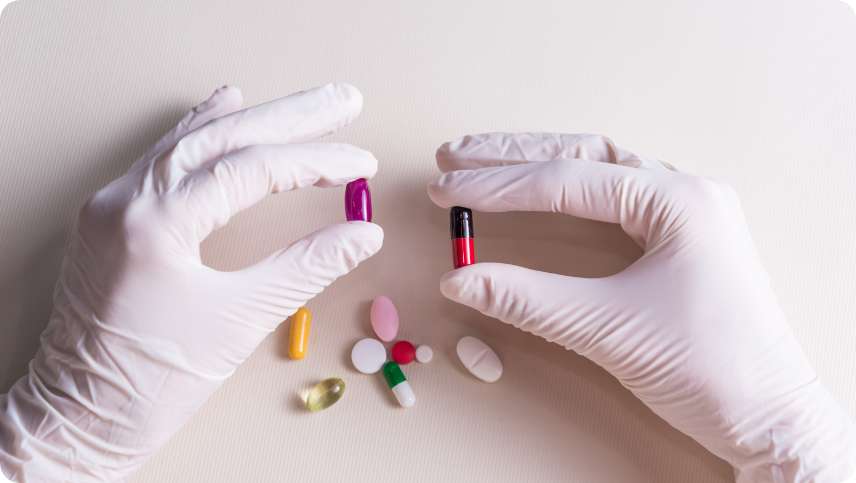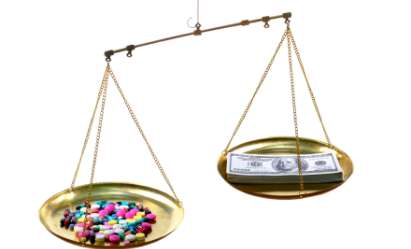
When it comes to the continually expanding world of pharmacology, the sheer number of brand-name and generic drugs can be pretty confusing for healthcare providers, let alone their patients. Patients are often prescribed one medication at their appointment, only to discover a different drug name on their bottle once they get home. But is there a difference between the two, or are generic drugs the same as their brand-name counterparts? As one of Canada's top prescription referral services offering over-the-counter and prescription drugs, we feel that understanding generic and brand-name drugs is essential knowledge for all our patients. This article will take an informative deep dive into generic medicine versus name-brand drugs to help you better understand the two.
In This Article:
What Is a Brand-Name Drug?
What Is a Generic Drug?
What Is the Difference Between Generic and Brand-Name Drugs?
When Should I Choose Name-Brand Over Generic Drugs?
Frequently Asked Questions About Generic vs. Brand-Name Drugs
What Is a Brand-Name Drug?
Brand-name drugs are medications created and trademarked by a pharmaceutical company sold under a specific branded identity. As with all potential new drugs, the pharmaceutical company will need to obtain a patent for the drug [1]. Once the Food and Drug Administration (FDA) approves the medication, they can market it to the public.
The company will choose an easy-to-pronounce, memorable name to help their brand-name drug sell better. Medication brand names like Abilify and Advair roll off the tongue much better than their actual drug names – aripiprazole and fluticasone-salmeterol.
U.S. patents for brand-name drugs have term limits. Usually, these last about 20 years [2]. During this time the brand-name drug is the only version of that medication available to patients. The exclusivity allows the pharmaceutical company to charge a higher price.
What Is a Generic Drug?
Once the patent to a brand-name drug expires, other pharmaceutical companies can produce their own version of the drug. This is where we get "generic drugs." Just like the brand-name drug, the generic drug must be approved by the FDA [3]. Any pharmaceutical company can produce a generic version of a drug once the patent expires.
What Is the Difference Between Generic and Brand-Name Drugs?
While there are many similarities between generic and brand-name drugs, there are still some differences. Let's take a closer look at each.
The Differences Between Generic and Brand-Name Drugs
The most significant differences between generic and brand-name drugs are their appearance. Due to trademark law, a generic version of a drug cannot look the same as its brand-name counterpart [4]. Generic and brand-name drugs may differ in:
Shape
Color
Packaging
Flavorings
Inactive Ingredients (Fillers, Coatings or Preservatives)
The Similarities Between Brand-Name and Generic Drugs
Generic medications are designed to work the same way as brand-name drugs [5]. They contain the same active ingredient needed for treatment and are the same as brand-name drugs when it comes to:
Quality
Dosage (How Much & How Often You Take It)
Strength
Administration (How You Take It)

When Should I Choose Name-Brand Over Generic Drugs?
In most cases, taking a generic drug seems like an obvious choice when you have the option between the two – after all, it's discounted and will provide the same results. However, there are some cases where it might be better to choose a brand-name drug over the generic version.
When You Take a Narrow Therapeutic Index Drug
Narrow therapeutic index drugs are medications in which slight differences in the dose or concentrations can lead to serious reactions. A 2009 study found that patients who switched from brand-name to generic antiepileptic drugs had more side effects and increased doctor visits [6]. Other drugs that fall into this category include blood thinners, thyroid medications and lithium. If your doctor initially prescribes the brand-name drug with these types of medications, you'll want to stick with it. If they prescribe the generic drug, you'll want to continue with that. Switching between the two versions can result in unexpected results.
When a Generic Drug Doesn't Work as Well for You
It's not common, but people may sometimes respond poorly when they switch to a generic drug. For example, the body may absorb medication differently due to how the tablet is made. Check with your healthcare provider if you suspect you've developed side effects after switching to a generic version.
Frequently Asked Questions About Generic Medicine vs. Name-Brand Drugs
At Drugmart.com, we care about your health and want to ensure you're completely satisfied with any medications you order from our website – brand-name or otherwise. If you need more information about generic and brand-name drugs before you order, check out the answers to our most commonly asked questions below.
Why Do Generic Drugs Cost Less Than Brand-Name Drugs?
Because the companies that produce generic versions don't need to cover research and development costs, they can sell generic drugs at lower prices. Additionally, because multiple companies will come out with generic versions of a brand-name drug, it creates market competition, forcing prices to drop.Generic drugs typically cost about 80% to 85% less than the same brand-name drug [4].
Are Generic Drugs Less Effective Than Brand-Name Drugs?
No. Generic drugs are every bit as effective as brand-name medications. According to the FDA, drug manufacturers must prove that their generic drug can be an effective substitute and offer the same benefits as a brand-name drug before it can be introduced to the public [5].
How Can I Be Sure I'm Getting the Right Medication If the Pharmacy Gives Me Generic Drugs?
To ensure you're getting the right medication, refer to the active ingredient on the drug label. The name of the generic drug may be different, but the active ingredient will be the same as the brand-name version. You can also talk to your doctor before filling your prescription to guarantee you get the proper medication.
Why Are Brand-Name Drugs So Expensive?
Manufacturers of brand-name drugs spend a lot of time and money to research, develop and conduct clinical trials to prove their drug is safe and works the way it is supposed to. This overhead often saddles brand-name drugs with hefty costs to cover the expenses.
Find Affordable Brand-Name and Generic Drugs at Drugmart.com
At Drugmart.com, we pride ourselves on our affordability, exceptional quality and ease of use when our patients shop for both brand-name and generic drugs. We work closely with the world's most reputable pharmacies to provide high-quality medications from Canada and other tier 1 international sources at unmatched prices, so you can get the treatment you need without worrying about affordability.





